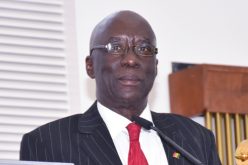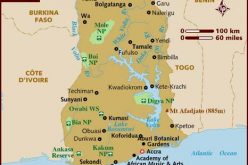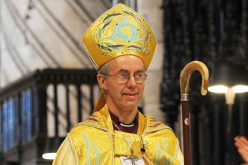MIDLU SHALMI, Nigeria (Morning Star News) – Anti-Christian hostility drove an Islamic extremist killing spree in this village in northeastern Nigeria, though the attack was portrayed mainly as politically motivated, an area Christian leader says.
In the course of an attempt to attack the deputy governor of Adamawa state last month, gunmen from the Islamic extremist group Boko Haram killed 14 Christians, including the cousin and two nephews of the Rev. Moses Thliza, head of a Christian organization dedicated to preventing AIDS and caring for AIDS patients and orphans.
“My cousin, Bulus Buba, was dragged out at gunpoint from his house by the Boko Haram members,” Thliza told Morning Star News. “They collected his car keys, demanded money and asked him three times to renounce his Christian faith, and three times he declined to do so.”
Thliza’s two slain nephews were skilled volunteers at the organization he heads, Christian Faithful Fight AIDS in Nigeria (CFFAN), and their passing has left huge gaps in the organization, he said. CFFAN’s work centers on AIDS prevention, care of orphans and treatment of those infected with HIV and AIDS, as well as training of pastors. The organization provides services in Plateau, Gombe, Taraba, Adamawa and Borno states.
Thliza and another eyewitness, Usumam Ijarafu, said about 30 of the masked attackers – identified in local press reports as members of Boko Haram – arrived in two vans in Adamawa state’s Midlu Shalmi village, in the Madagali Local Government Area, at about 1:40 a.m. on April 7 and set upon a Church of the Brethren Church (EYN) building. Over the next three hours, they also attacked the residence of the deputy governor of Adamawa state in the village and a house where Christians were mourning at a wake.
“They also went the pastor’s house of our [EYN] church in the village, where on sensing that armed men had stormed the church, the pastor escaped, but the attackers held his wife, Shuwa Ishaya, at gunpoint,” Thliza said.
The gunmen ordered her to lead them to the house of the church treasurer, but as they approached, he too escaped from his home, Thliza said. The Islamic extremists then proceeded to the house of state Deputy Gov. Bala James Nggillari, where they killed two guards keeping watch and held a third at gunpoint.
“The attackers met three guards on duty, killed two of them by cutting their necks with knives, and then proceeded to take the third guard, Amtagu Samiyu, at gunpoint to lead them to where the keys of the deputy governor’s house is,” Thliza said. “He led them to the house of my nephew, Ezra Isanga, about a kilometer south of the village, where his wife keeps the key to the deputy governor’s house. Ezra on opening the door of his house discovered that the men wore masks, and then he shut the door and ran out through a back entrance, raising alarm that Boko Haram men were in the village.”
The members of Boko Haram, which seeks to destabilize the Nigerian government and impose sharia (Islamic law) nationwide, took Isanga’s wife, Amina Ezra, at gunpoint. They took her also to the house of the deputy governor, gaining access with the keys in her possession. The official was not at home, so they only stole some items from his house, Thliza said.
“The noise from the confusion outside attracted the attention of two brothers, Ibrahim and Samuel [Bitrus], who as I said were my nephews,” Thliza said. “Both went out to see what was happening, and they were held at gunpoint, dragged into a room and shot by the Boko Haram members.”
Boko Haram identified two other people in the village square as Christians and killed them, he added.
Christians were observing the wake two kilometers away. Thliza said assailants asked to know what was going on there, and when they learned that people were saying prayers for an elderly Christian woman who had died, they charged in and shot into the crowd.
“The attackers went there and shot indiscriminately at the worshippers, killing eight Christians – two women and six elderly men,” he said. “In all, we buried 14 Christians. Some were injured and taken to the hospital.”
Christian leaders made efforts to contact security officials during the shootings, but no help came until the following morning, he said.
“Bulus Buba’s car was taken away too by the attackers after they killed him,” Thliza said. “While the attack on our village lasted, another group of Boko Haram members went to Abuja and kidnapped the daughter of the deputy governor, who hails from our village, but she was released shortly after.”
It was the first such attack at Midlu Shalmi, a village some eight kilometers (five miles) off the Maiduguri/ Yola highway about 300 kilometers (186 miles) from Yola, the state capital. Among those killed in Midlu Shalmi, according to Thliza, were Issa Ngga, Ayuba Yuguda, Ijabani Wagai, Hiszikia Joseph, Uludili Thlimda, Zara Ijabani, Jesse Waida, Iliya Buti, Kwaji Buti, Mjigimtu Usumana, and Mara Ijigil.
Neighboring villages were attacked prior to the Midlu Shalmi assault, Thliza said.
“The other villages attacked earlier include Madagali, 12 miles from my village, and Gulak, nine miles away, on two different occasions,” he said.
Besides the EYN church, Midlu Shalmi village is also home to Deeper Life Bible Church and Roman Catholic charismatic congregations.
“Political motive has been read into this attack, but this is not true because all the victims are not politicians,” Thliza said.
Jihad
The deadly assault was one of the latest religiously motivated attacks by Boko Haram. The group has stated that the sole purpose of its campaign of violence is to establish an “Islamic state like during the time of Prophet Muhammad,” though the U.S. Department of State continues to insist that the group is motivated by poverty and marginalization.
In its annual report released last month, the U.S. Commission on International Religious Freedom (USCIRF) notes, “The U.S. government consistently has urged the Nigerian government to expand its strategy against Boko Haram from solely a military solution to addressing problems of economic and political marginalization in the north, arguing that Boko Haram’s motivations are not religious but socio-economic.”
Advocacy group Jubilee Campaign, in an April 29 report on the State Department’s most recent country report on Nigeria, objected to the government’s position.
“The claim that the Muslims of northern Nigeria have been marginalized politically and economically by the federal government and responded to ‘legitimate grievances’ with violence is not credible,” the Jubilee Campaign report states. “This has been used to give unconscionable and undeserved legitimacy to violence committed against Christians in northern Nigeria, whether by terrorist actors such as Boko Haram or others.”
Jubilee Campaign states that Boko Haram has used religion as its primary recruiting tool, and that statements by the Islamic extremist group’s leaders reveal their motive for violence is “unambiguously waging Jihad.”
“No reference is made in the DOS [Department of State] report to their declared motive,” the Jubilee Campaign report states.
Thliza said the government of Nigeria must do more to stop Boko Haram.
“The truth is that Boko Haram is waging a Jihad, a religious war against Christians and the government, with the intention of establishing an Islamic state,” he said. “No government should allow a group of people to forcefully take over the governance of the people.”
Christians make up 51.3 percent of Nigeria’s population of 158.2 million and live mainly in the south, while Muslims account for 45 percent and reside primarily in the north, according to Operation World.
While Christians have shown great restraint in the face of attacks by Boko Haram and other Islamic extremists, the government must see Boko Haram violence as problem that requires bold confrontation, he said.
“As Christians, our prayers have always been that God should touch the heart of terrorists, that they will repent, and that their evil plans against Christians will be revealed,” he said.
Loss
Thliza’s slain nephews, 39-year-old Ibrahim Bitrus and 29-year-old Samuel Bitrus, were the sons of his younger brother Bitrus Kutiji Thliza.
“The murder of Ibrahim by the terrorists is devastating to us, because he has died leaving behind an aged mother and three kids – one of them was just born in January,” he said. “His death is no doubt devastating to our ministry and family.”
Ibrahim Bitrus was an information technology expert and program manager in three states for the ministry.
“Ibrahim, whether or not we have money, was prepared to work,” Thliza said. “He worked hard back home teaching at the Government Secondary School and at the same time serving the ministry. So, his death has impacted heavily on our ministry.”
The elder nephew, born in Thliza’s house while his father was serving in the military, had been trained at the ECWA Information and Computer Science Institute in Jos through Thliza’s sponsorship.
“Nobody has the training and capability of Ibrahim – even though he was not a health care worker, he had acquired enough experience in serving the ministry, which enabled him to do extremely well,” he said. “I relied on him without doubt to handle any project.”
Besides heading the program office in Madagali, Ibrahim Bitrus handled AIDS projects in Taraba and Gombe states, he added.
“We are praying that God will raise someone to replace him, but his death is indeed a great loss to us,” Thliza said.
Samuel Bitrus worked as an accountant and information technology expert as a volunteer, he said.
“This is a health care project, work that requires specialized training,” Thliza said. “More so, this is a faith-based organization. So we need people who share in the vision and who will work sacrificially in obedience to the command of our Lord Jesus Christ.”
c. 2013 Morning Star News. Used with permission.
Morning Star News is a 501(c)(3) non-profit corporation whose mission is to inform those in the free world and in countries violating religious freedom about Christians worldwide who are persecuted for their faith. For free subscription or to make tax-deductible donations, contact editor@morningstarnews.org, or send check to Morning Star News, 24310 Moulton Parkway, Suite O #157, Laguna Hills, CA 92637, USA.
Publication date: May 13, 2013











